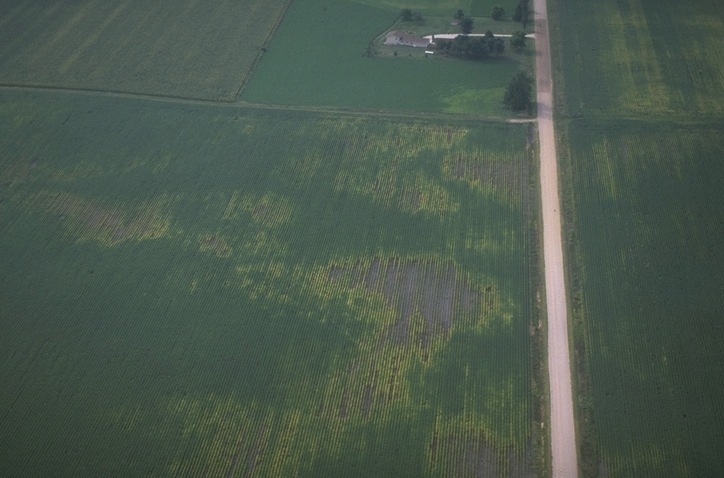
This aerial photo shows crop damaged by soybean cyst nematodes, microscopic roundworms that feed on the roots of soybeans. Field trials conducted by Iowa State University provide farmers with valuable data on the performance of various soybean varieties with genetic resistance to the pests. Image courtesy of Gregory Tylka. Larger image.
AMES, Iowa – Field trials led by Iowa State University scientists saved farmers and seed companies millions of dollars by helping them select soybean varieties resistant to a major pest, according to a new economic analysis.
The analysis was led by GianCarlo Moschini, Pioneer Chair in Science and Technology Policy in the ISU Department of Economics. The report found the Iowa State University SCN-Resistant Soybean Variety Trials have created a surplus of about $140 million in Iowa and Illinois between 2011 and 2016. The analysis estimates that farmers captured roughly a third of that surplus while seed companies held the rest.
The soybean cyst nematode, a microscopic roundworm that feeds on the roots of soybeans, is the greatest pathogen threat to U.S. soybean yields. Previous estimates showed the pests present in up to 70% of Iowa fields. Plant breeders have developed soybean varieties with genetic resistance to the pests, but the level of resistance and performance of these varieties can vary widely. So ISU scientists, supported by soybean checkoff funds from the Iowa Soybean Association, have conducted field trials every year since 1997 to evaluate hundreds of resistant soybean varieties. Annual reports of the results are published online at isuscntrials.info, and copies of the publications are printed and directly distributed annually to 70,000 to 90,000 households in Iowa and northern Illinois annually.
The economic analysis drew on data generated through the field trials as well as a proprietary dataset of farmers' seed choices. That dataset included the quantity and price paid for seed of specific soybean varieties. Using economic models, Moschini and doctoral student Seungki Lee determined how willing farmers are to pay a premium for resistant soybean varieties compared to susceptible varieties.
"Our study essentially matched the data produced by the trials over the period from 2011 to 2016 with data about farmers' specific use of soybean varieties over the same period," Moschini said.
The analysis found that farmers were willing to pay an additional $0.75 per acre for seed of resistant varieties included in the field trials experiments. Farmers also paid an additional $1.36 per acre for seed of SCN-resistant soybean varieties that performed above the median in terms of yield in the ISU experiments.
The results indicate farmers used the field trial data to inform their decisions of what seeds to plant, said Gregory Tylka, interim associate chair in plant pathology and microbiology who leads the field trials.
"Some farmers think all resistant varieties are created equal, but they're not, which is why we do the evaluation," Tylka said. "The analysis shows the value of our research overall but also that farmers value the varieties that perform well in the yield tests."
The full economic analysis, which was not supported by soybean checkoff funds, is available on the ISU Center for Agriculture and Rural Development's website.






